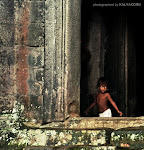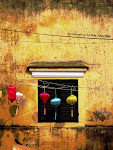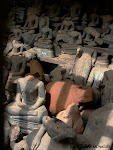If I say the sun is green, what would you say?
Of course, if you have seen the sun, you would probably think I'm crazy because the sun is supposed to be red or yellow. But if you really look at it, you would probably see the same thing I'm seeing. It's not the sun that is green, but it is my imagination that made it green. It is not the fact, it's just a thought.
However, that is not the way we run the classrooms, isn't it? It is obvious that the education now is developed out of knowledge of today. We we made assumptions of how education should be using researches and philosophies, not to forget about traditions of the education. Nonetheless, what we found today will become history as soon as the sun sets, which basically means that we developed the system of education based on history and beliefs. Yet, what we are doing as educators is to prepare our students for the future. The future that is yet to come. The future that even we are uncertain of. The future where what is right today maybe wrong then. Who knows, the sun may really turn green tomorrow.
Thus, the question is, what knowledge do we have to pass on to our students?
Brutally, the answer is probably no, we don’t actually have any of today knowledge that we are sure to be relevant 30 years from now. Then, what is our job? What is our role as educators, particularly as teachers? Is teacher a lecturer? Is teacher an instructor? Is teacher a facilitator? Well, if we don't have absolute right knowledge to teach, what can we lecture them about?
In this case, being a facilitator seems to be a little more appropriate for our job description. The key is probably to facilitate the learning for learning. In other words, we should equip our students with foundation for their life as a whole, where learning can continue throughout life in a self-directed manner. “The central task of education is to implant a will and facility for learning; it should produce not learned but learning people,” Ayn Rand. Our job is to facilitate students to develop their motivation in learning as well as their abilities to process the learning.
As mentioned above that the task is to implant the facility for learning, what is it that we have to do to facilitate the learning? Allow students to develop the personal growth, perhaps? Yes, there is the system where we still have to provide information and facts from text books, but do you think we should also leave some room for students to be themselves, express their thoughts and play with it a little bit? Meanwhile, they may have time to look back at themselves, learn about who they are, know what they want, and would eventually learn by themselves that learning is one way to achieve their goal.
As reading this, some people may start to nod their heads as educators around the world are also starting to appreciate the thought of educating the whole child. Not only we have to focus on literacy, we also need to focus on creativity, as Sir Ken Robinson said, "creativity now is as important in education as literacy and we should treat it with the same status." Unfortunately, though many schools and teachers are aware of this fact, the accentuation of creativity is yet not widely practiced. In 1999, a report on the importance of promoting creativity and culture in schools were sent to English government. A year later, a response made by the government, agreeing with the report. Today, "there has certainly been cultural activity in schools but even the strongest champions of creative and cultural education would have to admit that the report - called All Our Futures - has not dominated schools policy" (Baker, 2009). This is just one example of how the idea is already out there but has not been practiced.
Now, a much simpler example. We sure do provide enough time for students to practice on reading, writing, calculating and all those, but do we leave enough space for students to practice their creativity in classrooms? Do we have enough room for them to think and practice their imagination?
I remember an art class I had in kindergarten. The teacher taught me to paint the sun with red, water with blue, and mountains with green. I don’t remember if anyone asked why, but we were told it is what is it. This is the simplest example of how we are taught to be so limited in our imagination. A lot of times, education does not leave room for the learners to see what “it” can be because they were told what it is or what it should be even before they can start thinking about it. I was told the sun is red even before I could think about what color the sun could be. Once information is given by someone you believe to know more, in many cases, you just assume that it is the fact. No more questions needed to be raised, no more thinking needed to be processed because the answer is already there for you.
But even if I really thought the sun was green, do you think I would dare not to paint the sun red? The funny thing is we often hear someone says, "everyone is born creative." Isn't that true? Don't you agree that children are always creative? They always find ways to be so imaginative. Is it possible that because they "know less"? Since children know less, they see less boundaries when it comes to thinking or imagination. We were probably used to be as creative and as imaginative when we were smaller. Somehow, through education, we were put into, as Robinson said, right-or-wrong system and all the capability of being creative just seemed to fade away as we became someone who's afraid of being wrong. "If you are not prepared to be wrong, you will never come up with anything original" (Robinson, 2006). Nonetheless, that is how the education is until these days. We were told what is right and what is wrong. We were told the sun is red and the water is blue. What happens if you do the wrong things, you know that teacher can deduct your points and you would fail. And you if you keep on doing the wrong things, you would keep on failing and failing until you can become a failure. That is scary. It is always scary to be a failure. Then, it becomes a loop of not being able to think freely and be creative because you're afraid to fail. And what will happen to your creativity?
Well, if painting the sun green should make me be a failure, then I would always use red and only red.
..............................................................By Kalyakorn Naksompop
Written on December 6, 2009
(original article)

.jpg)

.jpg)
.jpg)


 With this being said, I personally believe that to educate is to provide the foundation for child’s personal growth as an individual in association with reality. To survive in the world that changes rapidly, one must be different and unique. He must have the ability to bring out the best of himself (individuality) and take it to the next level with creativity, but not to forget the truth of reality. Educators must help by facilitating children to develop these abilities at the cognitive level. Children must be educated with knowledge that doesn’t apply only in classrooms, but that is something they can relate to continually throughout life. Only in this case we can call education successful.
With this being said, I personally believe that to educate is to provide the foundation for child’s personal growth as an individual in association with reality. To survive in the world that changes rapidly, one must be different and unique. He must have the ability to bring out the best of himself (individuality) and take it to the next level with creativity, but not to forget the truth of reality. Educators must help by facilitating children to develop these abilities at the cognitive level. Children must be educated with knowledge that doesn’t apply only in classrooms, but that is something they can relate to continually throughout life. Only in this case we can call education successful.